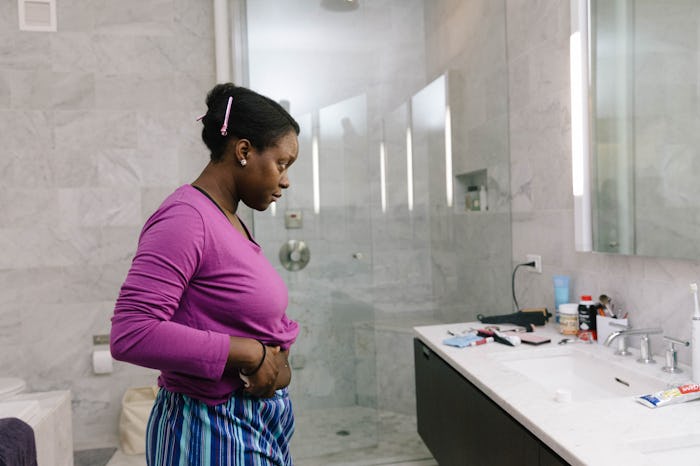Chances are, by the time you reach six weeks postpartum, you're exhausted from all the sleep deprivation, your hormones are exploding, and you're leaking everywhere. You have questions, but what about your OB-GYN? Do they know what's going on? Do they have questions? What your OB-GYN wants you to know at your six week postpartum appointment may be just what you need to hear.
The first time you see your OB-GYN or midwife after you've had a baby can be a really daunting task. This provider has ostensibly just seen you through nine of the longest months of your life, and it can feel like a test — at least it did for me. Am I breastfeeding enough? Is my vagina ruined? Will she know that I have absolutely no clue what I am doing in this parenting thing and just winging it and reading a lot of message boards? All of that ran through my head as I placed my feet in the stirrups.
There were also a lot of questions — on both sides — and shoving all of it between the other appointments and between my baby's feedings seemed really complicated, if not impossible. I was really lucky, though. My doctor breezed through it, putting my anxiety at ease, and she didn't even blink when I whipped out a boob and started feeding my son. In fact, total brag, she definitely complimented my son's appetite. (I won't mention his appetite at age 9, which seems to be superhuman.)
Recently retired OB-GYN and upcoming author, Dr. Marie Chun Liu, tells Romper that there's a lot that has to be discussed at that first appointment, but you shouldn't feel daunted by the process. Liu says, "This appointment is primarily concerned with assessing your healing. We (doctors) want to make sure that everything is as it should be, and that you're making progress. This isn't just an assessment of the physical, but also the mental." She says that many women are worried or ashamed to talk about any anxiety or depression they may be experiencing, and neglect to tell their providers. Liu insists,
"I want to know more than just how your body is feeling. If you're struggling mentally, I can help get you the care that you need. Most OB-GYNs and midwives have a roster of mental health care providers and support groups that they trust and can recommend."
As far as what your body is doing, Liu says this is typically the first doctor's appointment you've had since delivering, so unless your doctor has seen or spoken to you, you shouldn't have re-started your fitness routine or sex life. "You really do need to be evaluated before you jump back into your regular workouts, or begin new ones, and the same goes for sex. Yes, it's out of an abundance of caution, but healing takes time."
She notes that it's especially true for C-section moms, as it is an invasive surgery and can require even more time to heal. According to Liu, what doctors want you to know at your six week postpartum appointment is how you are feeling, if you have any questions or concerns about your pregnancy, labor, or delivery, how you're coping with motherhood, and overall, what you're worried about.
There will be an examination of your bowel and bladder habits, too, so don't cringe — it's actually really important. "Incontinence is very common after childbirth, and we can discuss strategies to abate the uncomfortable issue, and see it resolved," Liu adds.
She also says, "Yes, there will be a pelvic and physical exam, and we'll discuss birth control options and any health concerns that arose during your pregnancy, like diabetes or high blood pressure. But, this appointment is as much about helping the mother transition from mother-to-be to having a baby as it is about anything else."
I asked Liu about what I was most concerned with after my daughter — weight loss. But she tells Romper, "We'll likely talk more about nutrition and exercise than about weight loss specifically, unless you bring it up. As for weight loss, you shouldn't lose more than 5 pounds per month postpartum, unless you had a very high BMI before you became pregnant. If you're nursing, your caloric needs will be higher than if you're not, and while achieving and maintaining a healthy weight is very important, I'm more concerned with your pain and vaginal discharge than I am numbers on a scale. As long as you're doing your best to eat right and starting to get back into exercise, your doctor is probably happy."
It's refreshing to know that while your doctor is very concerned with your body, they're equally concerned with your mind, and yourself as a whole. It's easy to see your OB-GYN as merely a dictator who tells you that you can't have champagne and ham sandwiches, but when it comes down to it, they're just as worried about your health as you are — sometimes more so. Try to relax, and if you need to, write down your questions beforehand so you don't forget anything. And even if you want to, don't skip the appointment.
